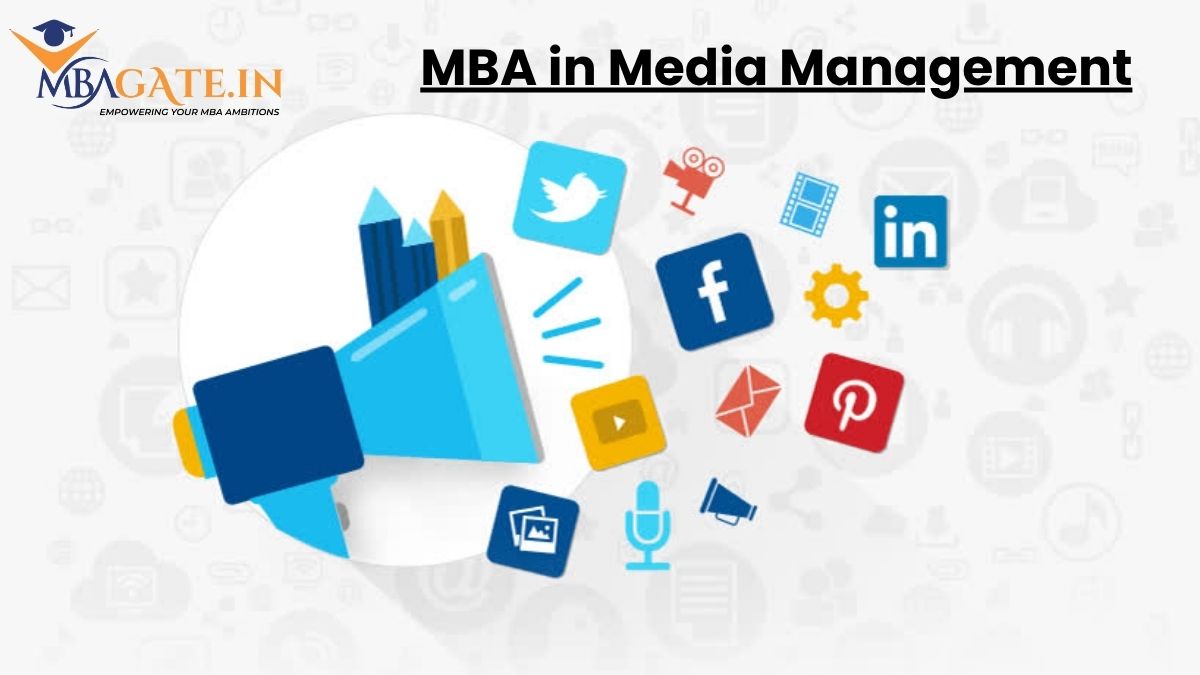MBA in Media Management
Table of Content
-
- + more items Show less
The program is typically of two years' duration and includes both general MBA and media-related studies. During the first year, the students study marketing, finance, operations, organisational behaviour and strategy. During the second year, focus switches to media-related subjects like media laws and ethics, trends in digital media, economics of media, analysis of audience, brand management, content creation, journalism and communications strategy. A few programs also offer electives in film production, media planning and social media marketing.
Practical experience is an important part of the MBA in Media Management course. Students often undertake real-life projects, internships and media industry case studies. Most institutes also bring media professionals to guest lecture and workshop so that students gain practical experience in the industry. This helps students learn content management, marketing, public relations, and managing media crises.
Eligibility for this course is generally a bachelor's degree in any subject with at least 50% marks. Some institutions may ask students to gain job experience or appear for entrance tests like the CAT, XAT, MAT or institute-specific examinations.
The graduates of this degree can be employed as media planners, brand managers, digital marketing directors, advertising executives, content managers, public relations officers and communication strategists. They may be employed in advertising agencies, media houses, production studios, entertainment companies, digital marketing firms and corporate communication departments.

Highlights
An MBA in Media Management is a specialised program that combines knowledge of media with business skills. It emphasises communication tactics, digital media, branding, marketing and content production. Students who complete the course will be ready for leadership positions in the digital media, entertainment, public relations, and advertising sectors. Industry-focused coursework, practical projects, internships and excellent placement possibilities in leading media companies and agencies are some of the program's strengths.
What is an MBA in Media Management?
An MBA in Media Management is a speciality that most of India's deemed universities provide. It is a type of speciality within a business degree. The curriculum of this program instructs students on how to manage media businesses like television networks, radio stations, film studios and internet media platforms.
Today, media can be found anywhere, such as the internet, movies, the news and advertisements. Professionals in this field assist in the development and delivery of public messages. The MBA degree educates students in the business skills needed to do marketing, finance and leadership, with a primary focus on the media business. They will be taught how to manage creative properties and coordinate media campaigns and initiatives. This course is perfect for people who enjoy media and desire to work in a commercial environment. It assists students in understanding the creative and business sides of media. Once they get an MBA in media management, they can become media managers, producers, marketing directors and digital content strategists. This course usually takes one to two years and includes classes, group assignments and internships. It is the best option for those who are eager to make a career in media, creativity or business. An MBA in Media Management opens up many career options in television, film, advertising, public relations and digital media.
Why is an MBA in media management beneficial?
Those students who already possess skills like interpersonal communication, creative writing, or content creation must pursue this degree program because they will be able to enhance and use their skills to the advantage of the media industry.
The media industry is growing at a fast rate, and most homes in the nation, irrespective of socioeconomic status, have access to at least one form of media.
The media platform throughout the country requires lively youths who can help the well-being of the media industry and the business's success by making plenty of audiences come to the infotainment that the industry offers.
The media sector needs graduates who can enhance the level of content, are statistically proficient, understand and aim for vital changes. Therefore, it is very simple for MBA (Media Management graduates) to secure employment upon graduation from the industry.
Subjects / Specialisation
Some of the media management specialisations encompass digital media management, whose curriculum is structured to deal with digital media platforms, content strategy, audience engagement and emerging technologies in digital settings.
Other specialisations are advertising management, which obliges students to deal with managing advertisements, designing them, planning media campaigns and formulating brand promotion schemes.
The MBA in Media Management program entails a course of study of the entertainment industry, including production and distribution of films, television programming, music and events, as well as their marketing. The program addresses global media planning, cross-cultural communication and other forms of media and other cultures and issues like international media operations management.
Eligibility
The following are the requirements for admission into the MBA in Media Management:
Applicants must possess a bachelor's degree. This can be in any field and from any recognised university. Admission is done on a passing grade of 50% and above or a relevant CGPA.
Candidates belonging to the reserved class (OBC/SC/ST) get a 5% concession over the mandatory 50% percentage.
Candidates can apply in the final year by bringing a no-objection certificate from the principal of their college.
Admission to the top universities demands a score of 60% and above.
Candidates applying to top colleges have to perform well in admission tests.
Admission Process
The steps for the admission process for an MBA in Media Management are as follows:-
Students are required to fulfill the following admission requirements.
Not many schools and institutions of higher learning have requirements of at least a year of applicable experience. People are able to acquire new skills that will lead them to success in the future.
According to each university's requirements, students must pass entrance exams such as the CAT, XAT, CMAT, SNAP, GMAT and others. The cut-off score will determine who is admitted to this course.
All shortlisted applicants must fill out the online or offline admission form and submit all necessary supporting documentation, including their Aadhar card number, proof of residency, grade sheets 10 and 12 and graduation grade sheet.
Having cleared the entry tests dictated by their respective universities, students then need to go through the group discussion and personal interview phases. These two phases are meant to assess communication and problem-solving capacity of the students.
The final institution selection is determined by the total score, which is calculated through the addition of the admission exam score, GD/PI score and work experience.
The outcome of the admission test and interview decides enrolment in the MBA course in entrepreneurship management.
Students can check their documents prior to paying charges and joining classes.
Colleges
Symbiosis University Indore provides a two-year MBA in Media Management at a price of ₹6.25 lakhs and an average annual package of ₹15 lakh. Welingkar University in Mumbai offers an 11-month Post Graduate Diploma in Media and Entertainment for ₹4.04 lakhs, with an average salary of ₹12.49 lakhs annually. Mudra Institute of Communications, Ahmedabad (MICA) provides a two-year PGDM in Communications at a higher price of ₹26 lakhs.
Career Prospects
MBA in Media Management students can take a number of different career directions. A degree in media and communication management gets students prepared for quality career prospects in media businesses or organisations like TV channels, radio stations, newspapers, film companies and online media sites. Job profiles include media managers, content developers, digital marketing professionals, and social media managers. Graduates may be producers, public relations officers, or advertising managers. The degree provides coverage of business and media skills. These skills are applicable in team-leading, initiative organisation and making good judgments in personal and professional life.
The majority of the graduates would like to work as a media manager, where they would be able to manage projects and ensure that everything works accordingly. The graduates may work as content creators or producers. Individuals may become journalists or work in any other sectors related to the media. The graduates can also work in advertising and marketing, helping brands to market their products using media campaigns.
In addition, social media management jobs, where one is responsible for a company's online presence, have become highly sought after. Others might choose to carry out media research in a bid to determine trends and audience behavior in order to make appropriate decisions.
Today, employers and corporations look for individuals who have the skill and knowledge to handle media operations along with finance, marketing, and communication expertise. Media employment opportunities are abundant at the local and international levels, in private and public corporations. Students who want to establish their own businesses or new projects can even establish their own media firms or be consultants. Thus, this MBA in the media management degree offers growth opportunities in the media sector and hence it is the best choice for those students who like creativity and also wish to work in business.
Future Scope
Web sites and online media have facilitated access for content creators, media planners and marketers to reach audiences everywhere across the globe. As companies seek to connect customers in innovative and productive ways, social media management and online marketing have been the most important focus areas. In addition, the need for data analytics specialists is on the rise because audience behaviour and media content optimisation are crucial to success.
There is a growing number of media managers who are involved in the production and distribution of content. As the media environment changes on a day-to-day basis, experts possessing excellent leadership, communication and strategic skills will be highly sought after. Further, the increasing focus on inclusive and diverse content has created exciting possibilities for those interested in creating messages and communicating with an audience. More generally, an undergraduate media management major provides access to a broad array of contemporary forward-looking career paths.
FAQs
Media Management is a field of study that manages and takes care of the operations and administrative tasks in different media industries or businesses, i.e., television, radio, print media, film and other digital businesses. The field of study is designed to plan, organise and control the production and marketing of information or entertainment content.
The available job profiles after completing the degree in media management include media managers, content creators, digital marketing experts and social media managers. Graduates have the opportunity to become producers, public relations officers and advertising managers. These skills are useful for leading teams, planning projects and making smart decisions in both personal and professional life.
Some of the best colleges for an MBA in Media Management are Symbiosis University Indore, Welinkgar University, Mumbai, Mudra Institute of Communication Ahmedabad and many others.
Some of the skill sets required for acquiring the degree in media management are Social media Analytics, Creativity, Communication skills, Community management, Content creation, Customer service, Project management, Strategy, Writing, Adaptability, Digital Marketing, Copywriting, Graphic design, Qualifications for a social media manager, Social media strategy, SEO basics, Time management, Brand voice development, Collaboration, Community Engagement, Analytical skills, Flexibility etc.
The average salary for MBA graduates in media management is ₹15.00 Lakhs per annum.
Media Management and Digital Marketing are different but are related in some aspects. Media Management has a prime focus on the strategic planning, execution and analysis of the media content. This includes both online and offline channels. Digital marketing on the other hand is a broader strategy that uses different online channels which include social media, SEO, email marketing and paid advertising to reach the desired marketing goals.
Artificial Intelligence has an impact on media management by automating the tasks, personalising the content, optimising SEO and streamlining the operations. This ultimately enables media companies to focus on creative and strategic methods. This automation allows for more efficient and effective methods for media management which further leads to improved audience engagement and content creation.
One can pursue this course with a BBA and an MBA degree in media management. It is an important part of operating a media strategy effectively for planning and managing market issues.
Several key trends are remaking media management including streaming and OTT platform growth the growing prominence of personal experiences through big data and AI, and the growing use of technologies such as blockchain and AI-enabled tools. Social media also continues to be influential, with such trends as short-form video, influencer marketing, and social commerce becoming progressively important.
Yes, one can pursue a degree in media management without a traditional background in media management. One can have a background in social media management, by focusing on developing relevant skills and building a strong portfolio through self-study, online courses and practical experience.









